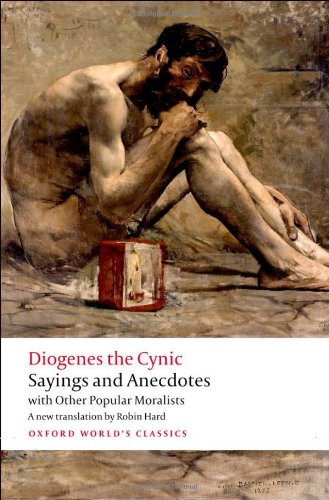
Diogenes the Cynic is famed for walking the streets with a lamp in daylight, looking for an honest man. His biting wit and eccentric behavior were legendary, and it was by means of his renowned aphorisms that his moral teachings were transmitted. He scorned the conventions of civilized life, and his ascetic lifestyle and caustic opinions informed the Cynic philosophy and later influenced Stoicism. This unique edition also covers his immediate successors, such as Crates, his wife Hipparchia, and the witty moral preacher Bion. The contrasting teachings of the Cyrenaic school, founded by Aristippos, a pleasure-loving friend of Socrates, complete the volume, together with a selection of apocryphal letters.
About the Series: For over 100 years Oxford World’s Classics has made available the broadest spectrum of literature from around the globe. Each affordable volume reflects Oxford’s commitment to scholarship, providing the most accurate text plus a wealth of other valuable features, including expert introductions by leading authorities, voluminous notes to clarify the text, up-to-date bibliographies for further study, and much more.

Against Civilization Far from being what’s today regarded a “cynic” these sayings and anecdotes are liberating and exhilaration follows in their wake. Embrace them and profit from nothing but sheerly becoming who you are, free from the consensual insanity of our modern world. Ignore them and despair in the vanity of self-dissolution and popular delusion. This is an excellent book and an excellent tonic for the soul. But beware: it’s contents are not for cowards, the weak, or those afraid to be lazy enough to put away their popularity via Herculean effort. Diogenes was nicknamed “the Dog” and his followers, of which I most certainly am, were called dog-philosophers. Today they are known as the Cynics, or “kunikoi.” This is a philosophy which teaches intense lived-experience and is not for armchair philosophers, which I along with the Dog, despise. Rebellious, self-willed, and ornery, but also witty and above all primal and practical. Bite into the pages of this wonderful book with all the pent-up fury that…
A must have for any Dog’s bowl -= When someone chided Diogenes on seeing him come out of a brothel, he said, “What’s the matter then? Should I have been coming out of your house?” =-Diogenes’ “Sayings and Anecdotes: With Other Popular Moralists” arrived yesterday. This is only just released by Oxford University Press. In a word – wonderful. This is in the “must have” category for all dogs.Virtually all of the original Cynic writings and records have been obliterated – all that remains are small seeds of anecdote and aphorism scattered to the winds. There has never been a systemic effort to collate all the fragments in the one place in a coherent manner. This book does exactly that – it has sifted through all available literature to date and extracted the verified seeds and catalogued them by context and history. It not only lists all of the surviving scraps, but also all of the variants that have mutated. Superb. In fact, if you are new to the enlightenment of Cynicism (which is antithetical…
Coming to see the world as it is… Much of Ancient Cynicism can be encapsulated in the phrase “Coming to see the world as it is…”. Diogenes and his entourage made it the objective of their lives to provide an honest (parrhesia), prophetic, and corrective assessment of the world as they saw it – prideful, misguided, ill, clouded. The Cynics’ job was to show others how to “See the world aright” and begin living in accordance with Virtue. This is the only way to begin to cure the ailments of the world. If much of this seems to have commonalities with religious sects and their message, it is no mistake – Cynicism was a missionary philosophy (though not religious by any means).It is critical to understand the Cynics and Diogenes if you want to understand ancient thought. Traditionally, ancient philosophy has focused on the “big” philosophers like Socrates, Plato, and Aristotle, but that is doing a disservice to many other thinkers whose influence was quite extraordinary in its own light. Aristippus, who is…